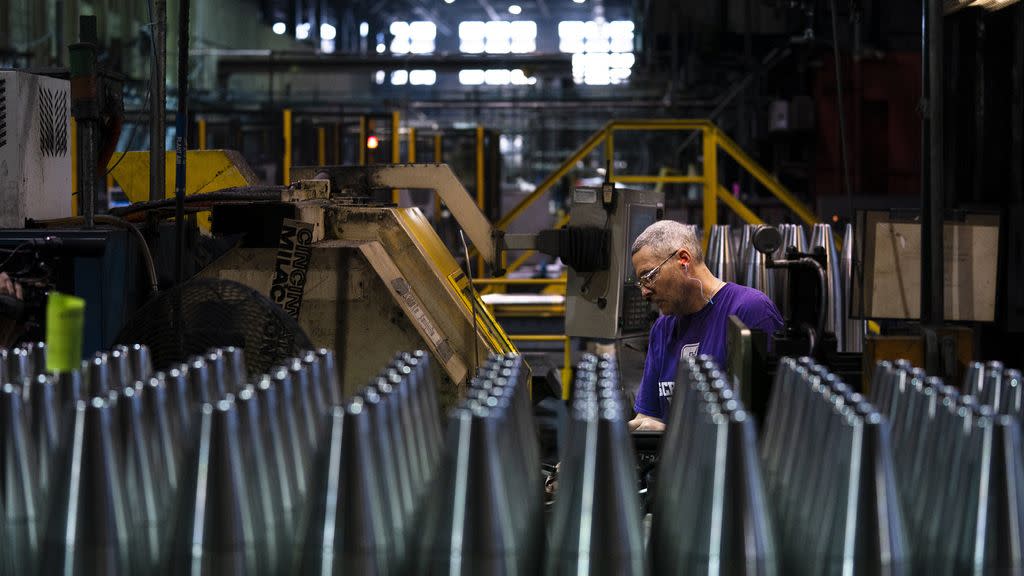Defence commissioner role needs industrial policy focus - analysts

Russia's invasion of Ukraine has thrown EU industrial and defence capabilities in the spotlight, leading to speculation that security will play a key role in the next commission, potentially also earmarking a new commissioner for defence.
Last year the bloc made an unprecedented move to use EU funds to boost ammunition production to support Ukraine's needs, and its overall defence spending reached a record €270bn - yet significant gaps in funding remain and there is still plenty of scope for steering the sector at EU level, analysts say.
"If you want the EU to take on a greater role in defence, it makes sense to give it a defence commissioner, because that creates institutional momentum and an institutional legacy," Sophia Besch, European defence policy fellow at the Carnegie Endowment for International Peace, told Euronews.
Besch stressed that even if such a new commissioner does not have much power at the outset, it would be a starting point from which the Commission could build in the future.
"When you talk to people about a defence commissioner, they think of a defence minister like at national level," said Sven Biscop, professor of European foreign and defence policy at the University of Ghent, adding that an EU commissioner could not decide on military operations or capabilities or influence budgets.
"All of that is not with the commission [in the EU treaties], so in reality a defence commissioner would be more like a defence industry commissioner," Biscop said.
Christina Kessler, an analyst at the Centre for European Reform (CER), agrees that a defence industry commissioner would be appropriate in the next mandate, "not just because there is obviously work to be done in this area, but also because it would signal that the EU is taking this seriously and is willing to step up its game".
The idea of a defence commissioner is not new, but it has been gaining traction in Brussels since current Commission President Ursula von der Leyen proposed it at a security conference in Munich earlier this year.
"If I would be the president of the next European Commission, I would have a commissioner for defence," von der Leyen told the audience in February.
The former German defence minister did not elaborate on the substance of such a role, however she stressed the importance of getting a strong portfolio for a central or eastern European candidate - and von der Leyen labelled defence as a ‘good portfolio’.
Not everyone, however, seems to agree that the post is necessary at all, fearing that it would duplicate the work of NATO and encroach on the territory of the High Representative for Foreign Affairs and Security Policy.
"I think it sort of makes sense to have in the External Action Service [EEAS] more of an operational military focus and then the Commission more of an industrial market focus," argued Besch.
So far, the defence agenda has been in the hands of French Internal Market Commissioner Thierry Breton and High Representative for Foreign Affairs and Security Policy Josep Borrell - both with broad portfolios, so what would be left for a defence industry commissioner?
"Looking at what the EU is currently doing there, it doesn't really seem like a super big portfolio," says Kessler, noting that the European Defence Agency (run by the EU's foreign policy chief) and the European Commission's Directorate-General for Defence, Industry and Space (DG DEFIS) are quite small.
More likely, according to the CER analyst, is that the Commission will "prop up" this portfolio with powers over areas such as cybersecurity - although space could also be an option to make the position more attractive, with DG DEFIS opening in 2019 to focus exclusively on the space and defence industry.
Analysts also see scope for a defence commissioner to strengthen the EU's cooperation with NATO to achieve its goals.
"After 25 years, we know that member states prioritise their NATO commitment, so let our defence commissioner focus on that," Professor Biscop said.
NATO members agreed last year to spend at least 2% of their GDP on defence, with the increase in spending driven by concerns over the war in Ukraine and industry representatives insisting on sustaining efforts over the long term.
Poland, with more than 4%, and tiny Estonia, both bordering Russia, are ahead of the US this year in the share of their GDP spent on defence - but seven EU countries, including Portugal, Italy, Belgium and Spain, are still below the 2% mark.
Connecting NATO formally with the role would be problematic for those member states - Austria, Cyprus, Ireland and Malta - which are not signatories of the treaty, however.
The Carnegie scholar also believes that an empowered defence position, on a par with the NATO secretary-general, would be very useful for the bloc.
"That [figure] might actually be useful for coordination between those two institutions," Besch said.
The final decision on whether a defence commissioner is appointed will be down to the next commission president, likely to be von der Leyen - but agreement on the next top jobs is still hanging on the outcome of next week's summit of heads of state in Brussels (27-28 June).

 Yahoo News
Yahoo News 
